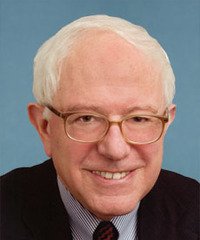
Bernie Sanders is serving his third term in the U.S. Senate after winning re-election in 2018. His previous 16 years in the House of Representatives make him the longest serving independent member of Congress in American history.
Born in 1941 in Brooklyn, Sanders attended James Madison High School, Brooklyn College and the University of Chicago. After graduating in 1964, he moved to Vermont. In 1981, he was elected (by 10 votes) to the first of four terms as mayor of Burlington. Sanders lectured at the John F. Kennedy School of Government at Harvard and at Hamilton College in upstate New York before his 1990 election as Vermont’s at-large member in Congress.
In the fall of 2008, after almost a decade of rampant greed and excessive risk taking, the global financial industry collapsed. In the aftermath, millions of hardworking Americans lost their jobs and their life savings, dashing the dreams of people who had nothing to do with Wall Street or the financial sector. While the Wall Street bankers who are directly responsible for these problems have fully recovered, middle class and working families are still struggling to find decent jobs, pay their bills and save for college.
Today, the six largest U.S. financial institutions have assets of nearly $9.8 trillion, a figure equal to about two-thirds of the nation’s gross domestic product. These six financial institutions issue more than two-thirds of all credit cards, over half of all mortgages, control 95 percent of all derivatives held in financial institutions and hold more than 40 percent of all bank deposits in the United States. Sen. Sanders believes we should break up these giant financial institutions that pose a systemic risk to the financial system and the economy as a whole. While Wall Street bankers continue to gamble with other people's money, sooner or later, when their bets go wrong, they will come back to the American people to be bailed out again. The last bailout included a staggering $16 trillion in total financial support from the Federal Reserve to every major financial institution in the country, as well as a number of corporations, wealthy individuals and central banks throughout the world. This figure was only brought to light after Sen. Sanders included an amendment to the Dodd-Frank Financial Reform bill that authorized the Government Accountability Office to conduct the first ever audit of the Federal Reserve’s actions during the financial crisis.
Sen. Sanders introduced legislation that would give the Treasury Department 90 days to identify commercial banks, investment banks, hedge funds and insurance companies whose “failure would have a catastrophic effect on the stability of either the financial system or the United States economy without substantial government assistance.” The Treasury Department would be required to break up these “too big to fail” financial institutions within a year. Sen. Sanders strongly opposed the bailout of failed Wall Street institutions during the fall of 2008, calling it "the most extreme example that I can recall of socialism for the rich and free enterprise for the poor."